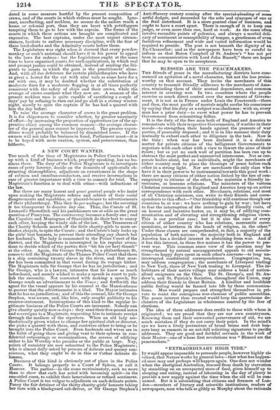A NEW COURT WANTED.
Too much of the time of Magistrates in Police Courts is taken up with a kind of business which, properly speaking, has no bu- siness there. The duty of the Police Magistrate is to investigate cases of petty larceny, decide on the demerits of apple-stalls ob- structing thoroughfares, adjudicate on extortioners in the shape of cabmen and omnibus-conductors, and receive intormations in case of greater importance with a view to commit for trial. The Magistrate's function is to deal with crime—with infractions of the law.
But there are many honest and quasi genteel people who insist upon making the Magistrate referee and arbiter of their social disagreements and squabbles, or placard-bearer to advertisements of their philanthropy. This they do per anzbages ; but the covering is too transparent to deceive any one. Thus, the Curate of St. Leonard's Shoreditch and his parishioners are at odds on the great question of Puseyism. The controversy becomes a family one ; and the Capulets and Montagues of Shoreditch do their best to annoy each other, keeping the windy side of the law. The Treasurers of the Charity Schools march off the little charity-girls to more or- thodox chapels, to spite the Curate ; and the Curate's lady locks up the girls' best bonnets, to prevent their attending any church but her husband's. The lady is summoned to the Police Court of the district, and the Magistrate is interrupted in his regular avoca- tions to decide which of the parties first "bit his (or her) thumb" at the other. Again, Sir George Stephen, in a philanthropic fit, comes to tell the Magistrate of the Thames Police Court that there is a ship containing twenty slaves in the river, and that mur- der has been committed in that vessel during its voyage hither. The Magistrate tells Sir George that he has no jurisdiction ; and Sir George, who is a lawyer, intimates that he knew as much beforehand, and merely wished to make a speech in court to pub- lish the enormity. Not contented with making a speech, Sir George sends an advertisement to the Times ; and forthwith the agent for the vessel appears by his counsel at the Mansionhouse to protest that the advertisement is a libel. The Mayor intimates that he has no jurisdiction; and of this the counsel, like Sir George Stephen, was aware, and, like him, only sought publicity to his counter-statement. Interruptions of this kind to the regular le- gitimate business of the Police Courts are incessant. Nobody can give charity quietly now-a-days : they send their five-pound notes and sovereigns to a Magistrate, requesting him to intimate receipt through the medium of the reporters. When an old lady me- thodistically given wishes to change her spiritual club or director, she picks a quarrel with them, and contrives either to bring or be brought into the Police Court. Even husbands and wives are in the habit of going there and giving vent to their spleens in con- fidential outpourings or recriminations, the reverse of edifying either to his Worship who presides or the public at large. Nay, points of casuistry are now submitted to the Police Magistrate ; who is almost daily asked by persons of delicate and queasy con- sciences, what they ought to do in this or t'other delicate di- lemma.
Business of this kind is obviously out of place in the Police Courts. It belongs properly to a Court of Spleen, or call it Honour. The parties—in the cases recriminatory, seek no more than to show that each has acted with becoming spirit—in the one-sided cases, to exhibit their benevolence or refined sentiment. A Police Court is too vulgar to adjudicate on such delicate points. Fancy the fair detainer of the thirty charity-girls' bonnets taking her turn with a blackguard cab-driver, or Sir George Stephen's Anti-Slavery oratory coming after the special-pleading of some artful dodger, and succeeded by the sobs and syncopes of one of the frail sisterhood. It is a more genteel class of business, an& ought to have a court apart. There is enough of it to keep one judge, or even more than one, hard at work. As the cases often involve recondite points of polemics, and always a morbid deli- cacy of sentiment or susceptibility of temper, a gentleman of even fastidious refinement and wide and varied information would be required to preside. The post is not beneath the dignity of an Ex-Chancellor; and as the newspapers have been so careful to inform us that Baron Campbell of St. Andrew's " has not yet been in communication with Lord John Russell," there are hopes that he may be open to its acceptance.


























 Previous page
Previous page